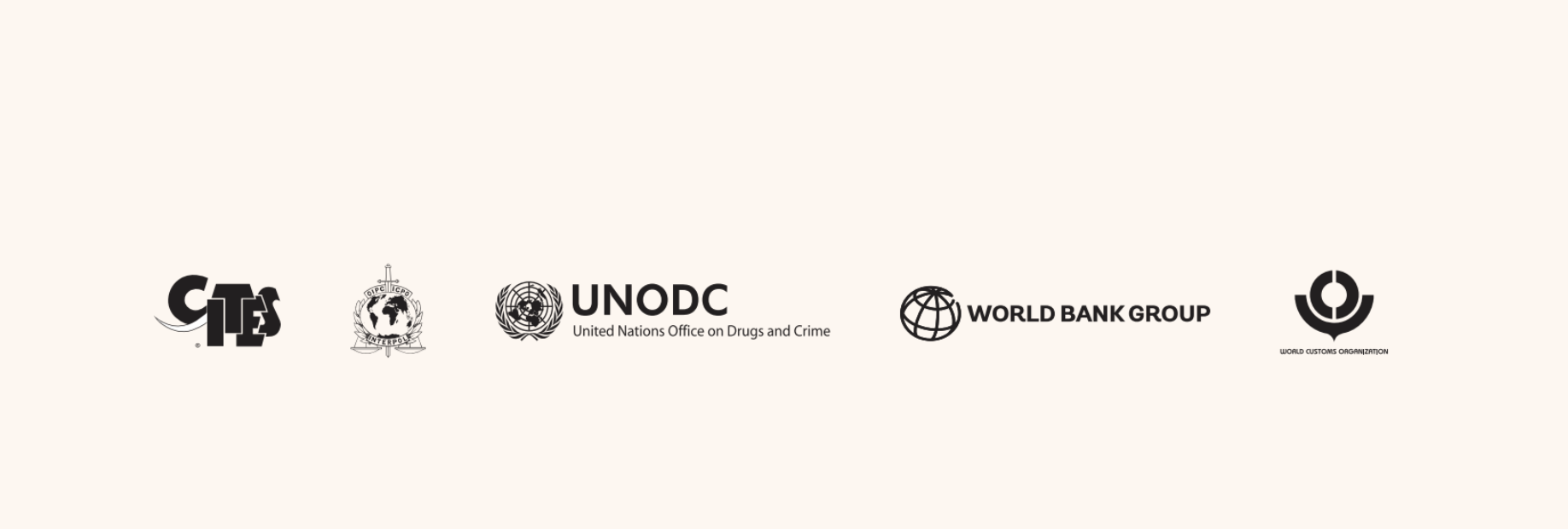The International Consortium on Combating Wildlife Crime (ICCWC) is the collaborative partnership of five inter-governmental organizations with complimentary and specialized mandates through which they are uniquely placed to collectively deliver a range of comprehensive interventions to strengthen criminal justice systems and build long-term capacity among authorities to address wildlife crime.
The partner agencies to ICCWC are the Convention on International Trade in Endangered Species of Wild Fauna and Flora (CITES) Secretariat, the International Criminal Police Organization (INTERPOL), the United Nations Office on Drugs and Crime (UNODC), the World Bank Group (WBG) and the World Customs Organization (WCO).
How does ICCWC work?
At national level, governmental agencies responsible for wildlife law enforcement together with prosecutorial and judicial authorities bring criminals engaged in wildlife crime to justice.
The five organizations comprising ICCWC provides a comprehensive range of tools and services and have extensive expertise that are under the auspices of the Consortium deployed collectively, working directly with authorities across the criminal justice chain and supporting them in preventing, detecting, investigating, prosecuting, disrupting and addressing wildlife and forest crime increasingly effectively.
Delivery of the Consortium’s activities is overseen by its Senior Experts Group (SEG) and supported by its Technical Experts Group (TEG), in which each of the five partner organizations are represented. The SEG identifies priorities for the implementation of activities, takes decisions on initiatives to support, and oversees overall effectiveness of delivery. The TEG provides technical expertise and coordinated country support based on the decisions made by the SEG. An activity delivered by ICCWC is normally led by one “lead” ICCWC partner. This partner takes responsibility for implementation of the activity, closely coordinating and collaborating with other relevant ICCWC partners and stakeholders in its delivery. In some instances, multiple ICCWC partner organizations can jointly “lead” an activity, taking collective responsibility for its implementation.
How does ICCWC provide support?
The Consortium promote and support evidence based interventions, provide targeted operational and technical assistance, and deliver comprehensive training and capacity-building. This is done based on needs and priorities identified, or requests received. Through their respective country or regional offices and bureaus, ICCWC partner agencies have access to an extensive global network that allows the Consortium to provide targeted support to national law enforcement agencies.
ICCWC partner agencies further provide globally mandated databases and secure communication channels, designed for use by law enforcement agencies. These enable real-time dissemination of law enforcement information and intelligence and engagement between law enforcement counterparts in different countries. It furtherassist national enforcement agencies in their risk-assessment, targeting and profiling activities and to facilitate and support investigations both at national level and in different countries.
ICCWC also offers a variety of platforms and substantial experience in coordinating multi-national activities and operations targeting wildlife and forest crime at regional and global levels.
For a detailed overview of the training courses, tools and services available through ICCWC, please see the ICCWC Menu of Services.
Letter of Understanding
The Consortium was formally established in November 2010, after the heads of each of the ICCWC partner agencies signed the ICCWC Letter of Understanding.
Read more about ICCWC in our brochure.
Related content
Our Focus: Wildlife and Forest Crime
What is wildlife and forest crime? ICCWC considers ‘wildlife’ to include all wild fauna and flora, including animals, birds and fish, as well as timber and non-timber forest products. ‘Wildlife crime’ refers to the illegal taking, trading (supplying, selling or trafficking), importing, exporting, processing, possessing, obtaining and consumption of wild...
4th Global Meeting of Wildlife Enforcement Networks
4th Global Meeting of Wildlife Enforcement Networks The Secretariat of the Convention on International Trade in Endangered Species of Wild Fauna and Flora (CITES), in cooperation with its partners from the International Consortium on Combating Wildlife Crime (ICCWC) and with generous funding support from the United States of America convened...
Wildlife Enforcement Networks (WENs)
What are Wildlife Enforcement Networks? Regional and inter-regional cooperation is essential to combating wildlife trafficking effectively. A number of networks with different purposes and objectives focused on combating wildlife crime, and with varying degrees of formality and organization, have been developed across the world. In most cases these networks are...


